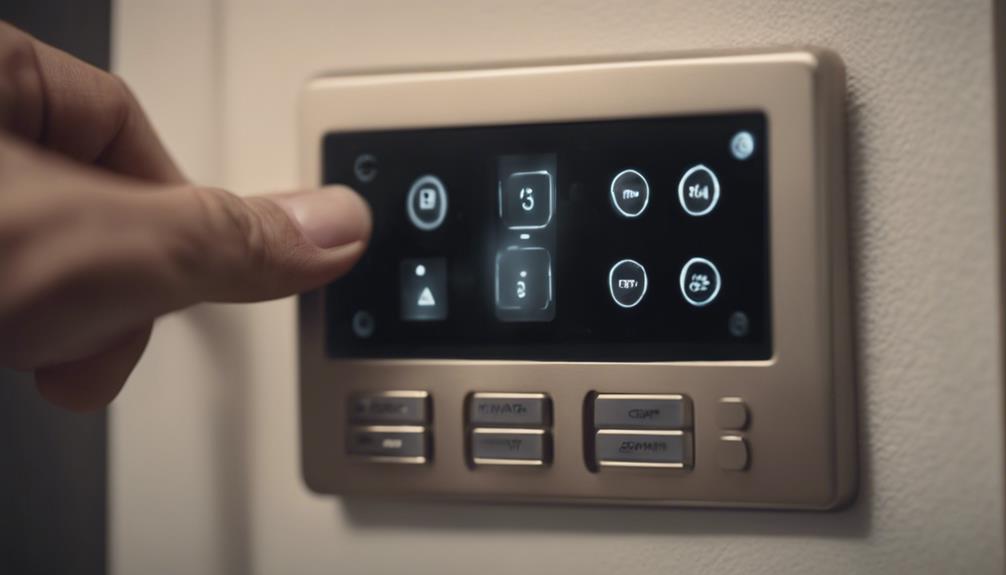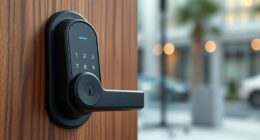Replacing your home security system can cost you anywhere between $200 for DIY systems to over $2,000 for professional installations. If you opt for DIY, you're generally looking at equipment costs that range from $140 to $600. Professional installation, especially for wired systems, can add another $120 to $1,600 to your total. Monthly monitoring fees typically sit between $10 and $65, depending on your chosen level of service. Different factors like equipment quality and installation methods influence these prices. There's plenty more to take into account, so let's explore what options might suit your needs best!
Key Takeaways
- Replacement costs for home security systems range from $200 for DIY to $2,000 for professional installation.
- DIY equipment typically costs between $140 to $600, while professional installation fees vary from $120 to $600.
- Monthly monitoring fees average between $10 and $65, depending on the service level chosen.
- Wired systems incur higher installation costs, ranging from $800 to $1,600, while wireless systems can often be installed DIY.
Average Replacement Costs
When it comes to replacing your home security system, you can expect costs to range from as low as $200 for a DIY setup to up to $2,000 for a complete professional installation. The average cost to replace your system reflects various factors, including installation fees and additional equipment.
If you opt for DIY options, you'll primarily pay for the equipment, which typically costs between $140 and $600 based on quality and type.
For those who prefer professional installation, you might encounter installation fees ranging from $120 to $600. Remember, monitoring your new system will add to your monthly payments, with fees averaging between $10 and $65.
If you want thorough protection, consider investing in additional equipment like cameras and sensors, which can range from $20 to $300 each. These replacement costs can quickly add up, so it's important to budget accordingly.
Ultimately, understanding these average replacement costs helps you make informed decisions about your home security systems and guarantees you choose the right setup for your needs.
Factors Influencing Pricing

When you're looking to replace your home security system, several factors can greatly impact your costs.
The quality of the equipment you choose, the installation method you prefer, and the monitoring service options available all play an essential role.
Understanding these elements will help you make informed decisions that fit your budget and security needs.
Equipment Quality Impact
The quality of your home security equipment plays a crucial role in determining the overall price of the system, with premium options often costing over $2,000 due to their advanced features and durable materials.
Basic equipment costs for security systems typically range from $200 to $400, but investing in higher-quality sensors and cameras can add $20 to $300 each to your total price.
Wired systems generally provide better reliability and can cost between $800 and $1,600 for installation. In contrast, wireless systems start at around $200 but may compromise on equipment quality.
If you're considering smart home automation features, be prepared for additional costs; standalone high-definition cameras and advanced motion detectors can range from $100 to $499 each.
Moreover, while professional installation can enhance the effectiveness of your high-quality equipment, it also incurs additional installation costs of $120 to $600.
Ultimately, understanding the impact of equipment quality on your home security system's price will help you make an informed decision that balances your budget with the level of protection you desire.
Installation Method Choices
Choosing the right installation method for your home security system can greatly impact your overall costs and convenience. You have options that range from DIY installation to professional installation. Understanding the differences can help you make an informed decision.
| Installation Method | Cost Range | Notes |
|---|---|---|
| DIY Installation | $200 – $600 | Generally for wireless systems |
| Professional Installation | $120 – $1,200 | Necessary for wired systems |
| Wired Systems | $800 – $1,600 | Requires professional installation |
| Activation Fees | Up to $230 | Additional fees for monitored systems |
When considering wired vs. wireless systems, remember that wired systems typically require professional installation. Additionally, service provider variability can affect pricing; for example, Abode charges $99, while SimpliSafe ranges from $124.99 to $254.97. Geographic impact also plays a role, with local labor costs inflating installation fees. Be mindful of additional installation fees, as these can quickly add up. Evaluating these factors will help you choose the best installation method for your home security system.
Monitoring Service Options
Monthly monitoring fees for home security systems vary widely based on factors like service type, provider, and location.
If you choose professional monitoring services, expect to pay between $20 and $60 monthly. For example, ADT starts at $20, while Vivint ranges from $40 to $60.
On the other hand, self-monitoring options are often more affordable, averaging around $10 per month, although they may compromise your safety compared to professional services.
When evaluating monitoring costs, don't forget about activation fees, which can add up to $230 to your initial costs. These fees will impact your overall budget for home security systems.
Additionally, your geographic location plays a significant role in pricing; local regulations and demand can lead to higher costs in some areas.
Ultimately, it's important to reflect on what level of monitoring you need and what fits your budget.
Balancing cost with safety is vital, so take the time to explore all available options to find the right monitoring service for your home.
Installation Options and Costs

When it comes to installing your home security system, you have two main options: DIY or professional installation.
Going the DIY route can save you a significant amount of money, while professional installation comes with costs that vary based on the complexity of the system.
Understanding these installation options can help you make the best choice for your budget and security needs.
DIY Installation Savings
Opting for DIY installation can lead to substantial savings, with initial costs starting around $200 compared to professional fees that can soar to $600 or more.
Many popular home security systems, like Ring and SimpliSafe, provide user-friendly DIY packages, allowing homeowners to set up their systems independently. This approach not only reduces your out-of-pocket expenses but also offers flexibility to customize your security setup according to your specific needs.
When you choose DIY installation, you can avoid activation fees that often reach as high as $230 for monitored systems, making this option even more financially appealing.
You'll also sidestep the average cost of professional installation, which can escalate to $1,600 for hardwired systems.
Professional Installation Costs
Professional installation costs for home security systems can vary widely, typically ranging from $120 to $600 based on the system's complexity and the provider you choose. Some providers may offer promotions or discounts, which could help reduce the overall home security system installation cost. Be sure to research different companies and compare quotes to find the best deal that fits your budget. Additionally, certain systems may offer DIY installation options, which can further lower your home security expenses.
If you're looking at wired systems, prepare for higher costs, averaging between $800 and $1,600 due to the need for specialized labor and materials.
Some brands offer self-installation options, like Ring and Frontpoint, which can save you on installation fees.
When you're considering the total installation cost, keep in mind that the size of your home and the number of devices you'll need play a significant role. Larger homes often require more equipment and installation time, which can increase the overall price.
For example, average installation fees for specific brands include:
- $99 for Abode,
- $124.99 to $254.97 for SimpliSafe,
with some companies providing free installation with contracts.
Ultimately, understanding these factors will help you budget effectively and choose the right security services for your home.
Monthly Monitoring Expenses
Monthly monitoring expenses for home security systems can range from as low as $2.99 to around $65, depending on the service you choose. When considering monthly monitoring fees, it's important to evaluate your needs and budget.
Professional monitoring services generally start at about $20 per month, with home security companies charging higher rates for added features. For instance, ADT typically charges around $45.99, and Vivint ranges from $40 to $60.
If you're interested in DIY home security systems, you might find self-monitoring options appealing, with prices as low as $2.99 through providers like Wyze. Many companies, including Ring, even offer free plans.
It's also worth noting that providers like Abode have flexible monitoring plans, charging $6.99 for self-monitoring and $24.99 for professional services.
Monthly costs can greatly impact your overall investment in home security systems, making it vital to compare average costs and contracts. By carefully evaluating your options, you can choose a monitoring plan that fits your budget and security needs while avoiding unnecessary installation costs.
Types of Home Security Systems

Understanding the types of home security systems available can help you make an informed decision that aligns with your monitoring preferences and budget.
You can choose between wired systems, which typically range from $800 to $1,600 and require professional installation, and wireless systems, costing between $200 and $2,000, often allowing for DIY installation.
If you prefer ongoing oversight, monitored systems incur monthly fees ranging from $10 to $65, while unmonitored systems usually have lower initial costs but lack professional support.
DIY systems offer flexibility and can start as low as $200, making them an appealing option for budget-conscious individuals.
For those interested in modern technology, smart home integration features enhance convenience but may increase overall costs.
Advanced systems come equipped with security cameras, motion detectors, and various home security devices. Prices for standalone security cameras can range from $100 to $499, depending on their functionality.
Ultimately, evaluating the installation costs, ongoing monthly fees, and the features you value most will guide you toward the right choice for your home security needs.
Money-Saving Strategies

Implementing money-saving strategies for your home security system can help you protect your property without breaking the bank. Here are some tips to contemplate:
- Opt for DIY installation: This can save you significant installation costs, which typically range from $120 to $600.
- Choose self-monitoring: Instead of paying $22 to $35 monthly for professional monitoring services, explore self-monitoring options that average around $10 per month.
- Look for discounts: Security companies often offer promotions, discounts, or bundled services that can lower your initial purchasing and ongoing monitoring costs.
- Assess your needs: Regularly review your security requirements to avoid paying for unnecessary features or equipment that don't enhance your home security systems.
Frequently Asked Questions
How Much Does It Cost to Replace a House Alarm?
When you're looking to replace a house alarm, costs can vary widely. Basic systems start around $200, while extensive setups might exceed $2,000, depending on equipment, installation, and monitoring options you choose.
How Often Should You Replace Your Security System?
Think of your security system like a trusty old car; it needs regular updates. You should consider replacing it every 5 years or sooner if components falter, ensuring you stay safe and up-to-date with technology.
Do You Need an Electrician to Install a Security System?
You don't always need an electrician to install a security system. Wireless options are DIY-friendly, but wired systems typically require professional help for proper setup and compliance with local electrical codes. Choose what fits your needs.
Does a Home Security System Increase Property Value?
You'll find that a home security system can considerably enhance your property's allure. Many buyers appreciate the peace of mind it offers, often leading to higher sale prices and quicker transactions in today's competitive market.
Conclusion
Replacing your home security system is like upgrading your armor; it's essential for protecting what matters most.
By understanding average costs and the factors that influence them, you can make an informed decision that fits your budget.
Whether you choose DIY installation or professional help, exploring various system types and monitoring options can save you money in the long run.
Remember, investing in security is investing in peace of mind for you and your loved ones.









